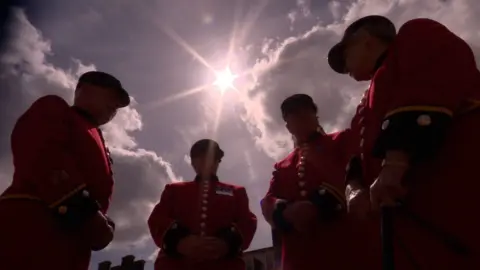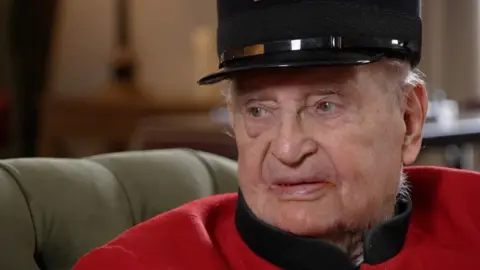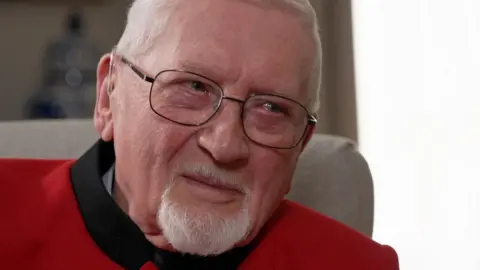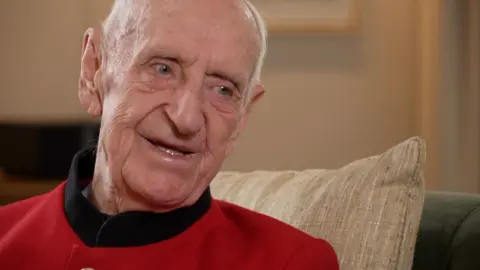VE Day 80: Chelsea Pensioners tell their WW2 stories
 BBC
BBCA scarlet coat with nine shining buttons hangs neatly beside each door along the corridors of the Royal Hospital Chelsea.
Many rooms have personal decoration outside. At one, a wry sign reads: "No singing, no dancing, no swearing - this is a respectable house." Those rules often broken, surely.
Three hundred British army retirees live here, known as the Chelsea Pensioners.
The current age range is 66 to 103 years old - and those who fought in World War Two are particularly revered by the younger folk.
Immaculately dressed pensioners offer us a polite "good morning" as we walk through the grounds.
Discipline, from a life of military service continues into retirement. So too, the camaraderie - extending to an unofficial buddy system between the oldest and youngest.
Jo Molendo, head of in-pensioner welfare, says: "They might have served with a 20 or 30-year difference but the regimental tie is strong and they will support a fellow veteran from that regiment, no matter what."

So when John Morris, currently the oldest Chelsea Pensioner, arrives promptly for his interview, he is accompanied by 73-year-old, Charlie, jovially helping him along. John turned 103 on the day we visited.
"I gave myself the nickname, 'Cat' Morris because I thought I had nine lives," he says.
Perhaps his first was used while part of the Anti-Aircraft Battery during London's Blitz. He was called up, a boy of 17, when World War Two broke out.
"I went right through the Battle of Britain and then the Blitz moved to other parts. Weston-super-Mare - that was bombed very badly. I remember I helped bring out the dead bodies from the houses that had been blitzed."
After transferring to the Essex Regiment, John was sent to Algiers.
"They sat me on top of a flat-topped building to fire at any shooters coming over, trying to bomb us. It was a very hairy job, that was," he admits.
John was hospitalised with hepatitis before being caught up in March 1944 in the last major eruption of Mount Vesuvius in Italy - and then volunteered to join the Raiding Support Regiment, a branch of the Special Air Service (SAS).
"When I joined the Special Forces, I didn't expect to come back alive. When you're with that sort of operation, you know you're living on death's door all the time. But being young and stupid, I used to volunteer for anything."
John survived the war relatively unscathed, but rues that thousands of others were not so fortunate.
It is these World War Two veterans and their incredible stories that we think about on VE Day. In the hospital courtyard, a huddle of younger Chelsea Pensioners talk of them with reverence.
"The friends that they lost - and what they saw - you just respect them and feel for them," says Denise Williams, who at 66 is the youngest pensioner.
Bill Horsburgh, 84, adds: "You've got to give them respect and admiration for what they did - and especially for the guys, and girls, who didn't come home. They're the real heroes."

Weeks before the war ended, Brian Howarth, 99, parachuted over the Rhine into Germany.
"It was a terrible drop - the people that were killed and planes on fire - I think there were 20% casualties," he remembers.
Having survived the advance, he was wounded a few days later. "I felt something. A bang in my stomach, you know? And I said, 'I've been hit.'"
The soldier he was with at the time was shot in the chest and killed.
Brian went by ambulance plane back to England and was treated at Nottingham General Hospital.
"I had penicillin. You see, penicillin wasn't allowed for civilians - it had only just come out - but it was allowed for military. And I think it saved my life."
So he was in hospital on VE Day, in a ward with windows behind each bed.
"The nurses came round and they gave us a mirror to hold over our heads so we could look through the window at the crowds below. They were dancing and really enjoying themselves."
As 85-year-old Tony Judge observes, the effort to win the war involved many people.
"My mother, at 14 years old, was member of a searchlight crew here in London," the Chelsea Pensioner says. "They just needed everybody to do something - and everybody did."

Harry Wright, 94, was a primary school-aged child when an incendiary bomb dropped through the roof of his home.
"Fortunately, it didn't fully engage. I was standing there with my father and mother, looking at this thing," he says. "My father dealt with it and all was well. That is something I remember and I haven't forgotten that for all those years."
Harry, who was a 14-year-old Army apprentice on VE Day, actually remembers it as a quiet event.
"When I see it on the television, I'm amazed - absolutely surprised - the volume of people and behaviour. But consider what happened in the past six years from '39 to '45 - and what people had to endure.
"It's no wonder the eruption when it was announced."
Harry became a sought-after helicopter expert during his years in the military, for which he received a British Empire Medal. He wears the honour with remarkable humility.
Jonny Lowe, head of veterans outreach, says: "What I particularly love about that generation is that there's a complete lack of ego - it's quite selfless.
"What they did was in defence of this country, directly."
Those who lived through World War Two are dwindling in number as the years go by. But they pass their stories to the next generation of pensioners within the walls of the Royal Hospital Chelsea.
As Chelsea Pensioner, Barbara Whilds, 81, says: "It's what this place is about - memories."
